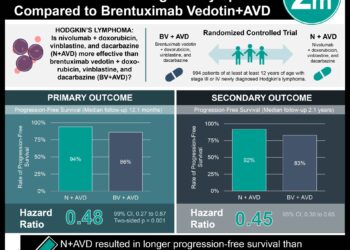Safety, Tolerability, and Potential Clinical Activity of a Glucocorticoid-Induced TNF Receptor–Related Protein Agonist Alone or in Combination With Nivolumab for Patients With Advanced Solid Tumors
1. The glucocorticoid-induced TNF receptor-related protein agonist, BMS-986156, is safe and tolerable as monotherapy and in combination with nivolumab.
Evidence Rating Level: 2 (Good)
Although immune checkpoint inhibitors (ICI) have shown clinical efficacy in a wide variety of cancers, a significant portion remain unresponsive to checkpoint blockade. Therefore, new strategies for modulating the critical balance of T-cell activation and antigen tolerance are needed. Agonistic antibodies targeting the glucocorticoid-induced TNF receptor-related protein (GITR) have been hypothesized to synergize with and augment the effect of ICIs. The GITR-agonist BMS-986156 was engineered to increase T-cell activation and deplete intratumoral regulatory T cells. In this open-label, non-randomized, phase I/IIa study, 292 patients with advanced solid tumors and an Eastern Cooperative Oncology Group (ECOG) performance status of 1 or less were assigned to either BMS-986156 as monotherapy at varying doses (10, 30, 100, 240, or 800 mg), or in combination with 240mg of nivolumab every 2 weeks. One cohort also received 480 mg of BMS-986156 plus 480 mg of nivolumab every 4 weeks. The primary endpoints were safety, tolerability, and dose-limiting toxic effects. Key secondary endpoints included antitumor activity and exploratory biomarker analyses. The monotherapy cohort included 34 patients (4 patients completed initial treatment), and the BMS-986156 cohort included 258 patients (65 patients completed initial treatment). Baseline characteristics were similar between the monotherapy and combination therapy cohorts. Researchers found that the safety profile of BMS-986156 was tolerable; no grade 3 to 5 treatment-related adverse events occurred with BMS-986156 monotherapy; grade 3 to 4 treatment-related adverse events occurred in 24 patients (9.3%) receiving BMS-986156 plus nivolumab, with no grade 5 treatment-related adverse events. There was a trend towards an increase in CD8+ T-cell and natural killer cell proliferation after administration of both BMS-986156 monotherapy and combination therapy, although these results were not statistically significant. No clinical responses were seen with BMS-986156 monotherapy, and objective response rates ranged from 0% to 11.1% across combination therapy cohorts, similar to historically observed objective response rates with anti-PD-1 therapy alone. This study was limited by the lack of comparator groups, such as a nivolumab monotherapy group; therefore, the contribution of the GITR agonist to the clinical activity of the combination therapy remains unclear. Overall, this study highlights the safety and tolerability of the GITR agonistic antibody BMS-986156 with or without nivolumab, but further studies with comparator groups are warranted to determine if this therapy is an effective strategy in a broad patient population.
Click to read the study in JAMA Oncology
Image: PD
©2019 2 Minute Medicine, Inc. All rights reserved. No works may be reproduced without expressed written consent from 2 Minute Medicine, Inc. Inquire about licensing here. No article should be construed as medical advice and is not intended as such by the authors or by 2 Minute Medicine, Inc.







